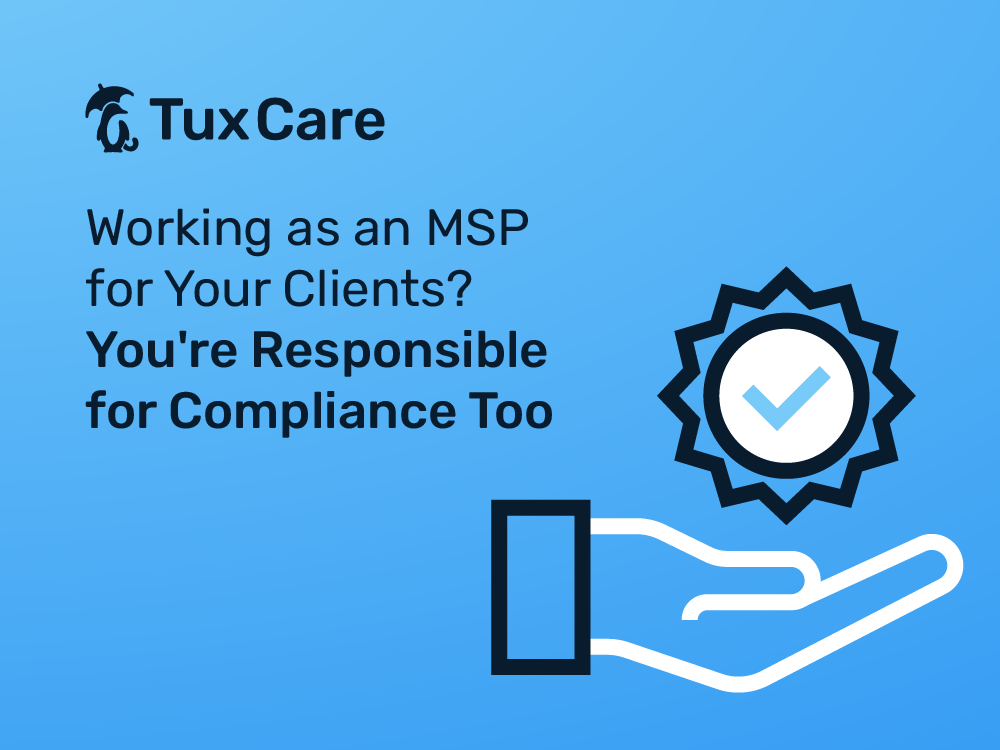Working as an MSP for Your Clients? You’re Responsible for Compliance Too
Managed Service Providers (MSP s) play a critical role in maintaining reliable and secure systems for their clients. But, as a trusted technology partner, MSPs have another important role too: ensuring their customer’s systems are compliant with sector-specific and broader compliance laws.
The risks of noncompliance can be substantial, ranging from legal and financial penalties to reputational damage and loss of business. Many companies are aware of their obligations to comply with relevant regulations, but who ensures compliance in practice? What happens if technology services are handled by an MSP?
In this article, we will discuss the factors that impact technology compliance and why MSPs should be proactive in addressing these concerns. We will also discuss the tools available to MSPs, such as live patching, which can enhance compliance efforts.
Understanding Compliance Regulations
Compliance regulations are set of rules and standards that in-scope businesses must adhere to when it comes to protecting sensitive data, including financial, medical, and personal information. In the US, there are several federal and state laws that govern data protection and IT compliance.
For example, healthcare organizations are commonly covered by the Health Insurance Portability and Accountability Act (HIPAA), while companies that handle payment card data are covered by the Payment Card Industry Data Security Standard (PCI DSS). Any company doing business with customers in the European Union would be covered by the General Data Protection Regulation (GDPR).
While these regulations differ in their scope and applicability, they share a common goal: to protect sensitive data from unauthorized access, use, or disclosure. Failure to comply with these regulations can result in expensive legal penalties, fines, and lawsuits.
The MSP’s Role in Compliance
MSPs play a critical role in ensuring that their clients comply with data protection and IT regulations. As the company that their clients rely on for secure systems, MSPs are responsible for ensuring that their clients’ systems are compliant with applicable regulations.
One reason MSPs are responsible for compliance is that they have access to sensitive data stored on their clients’ systems. By providing IT services to their clients, MSPs have a duty to protect their clients’ data from unauthorized access or disclosure. This means that MSPs must take proactive steps to secure their clients’ systems, including implementing firewalls, antivirus software, and data encryption.
Moreover, MSPs have the technical expertise and resources to help their clients comply with relevant regulations. By staying up to date on regulatory changes and best practices, MSPs can advise their clients on how to implement appropriate security measures, ensure data privacy, and maintain compliance with applicable regulations.
Challenges in Ensuring Compliance
While MSPs are responsible for compliance for their clients, ensuring compliance can be challenging due to several factors.
First, compliance regulations are complex and often subject to interpretation. This means that MSPs must have a very real, very deep understanding of regulations and how they apply to their clients’ systems. With different regulations applying to different clients, this can quickly become a challenge and – in some ways – it can seem like compliance goes beyond the remit of an MSP.
Second, compliance regulations are constantly evolving, making it hard for MSPs to stay up to date on the latest requirements. MSPs must be proactive in monitoring regulatory changes and adjusting their clients’ systems accordingly. Again, compliance isn’t really the core business of an MSP – the core business is to deliver, maintain, and secure IT systems.
Worse, compliance regulations often involve trade-offs between security, usability, and costs. MSPs must balance the need for robust security measures with the need for user-friendly systems that are easy for clients to use – while doing it all within a restricted cybersecurity budget.
Tools for Ensuring Compliance
To ensure their clients stay compliant with data protection and IT regulations, MSPs should focus on tried and true information security measures – the same measures that can take advantage of several tools and strategies, including:
- Vulnerability Scanning: MSPs can use vulnerability scanning tools to identify potential security weaknesses in their clients’ systems and address them proactively.
- Multi-Factor Authentication: Multi-factor authentication adds an extra layer of security to clients’ systems, ensuring that only authorized personnel can access sensitive data.
- Data Encryption: MSPs can encrypt sensitive data stored on their clients’ systems, reducing
the risk of unauthorized access or disclosure. - Live Patching: Live patching allows MSPs to apply security patches to their clients’ systems in real time, reducing the risk of vulnerabilities and ensuring compliance with applicable regulations (without the associated disruption).
That said, keeping abreast of specific compliance regulations also helps because it means MSPs harden protection in the areas that really matter.
MSPs and Compliance – It’s Unavoidable
Whether managed services providers like it or not, they’re in the thick of it with compliance. When the cybersecurity buck stops at the MSP (or indeed MSSP) it means that the compliance buck also stops with the MSP. The best course of action? Using the latest cybersecurity tools available – including live patching.
Live patching enables organizations to minimize their vulnerability exposure window, patch faster, and stay compliant – all while avoiding patching-related downtime and disruptions. By patching without reboots, live patching allows companies to put their patching on autopilot, immediately applying the latest vulnerability patches in the background while their systems are running.
TuxCare’s live patching solution, KernelCare Enterprise, delivers these automated and non-disruptive patches to all popular Linux distributions as well as shared libraries, IoT devices, and more.
To learn more about KernelCare Enterprise or live patching in general, talk to one of our Linux security experts.



 Documentation
Documentation Login
Login



